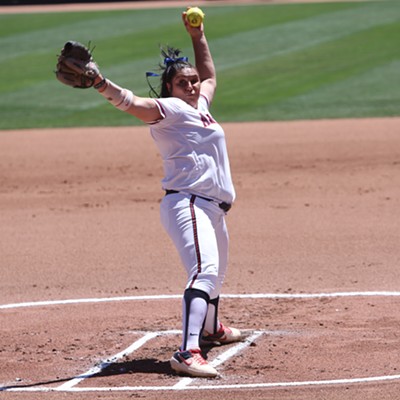When did University of Arizona softball become just another team?
When did the program that was such a staple at the Women's College World Series suddenly become just one of the 291 schools participating in Division I softball?
When did the Wildcats become irrelevant in the game they helped pioneer as the go-to sport for young girls to earn a college scholarship?
From 1988 to 2010 you could almost write "Arizona" in permanent marker for a spot in the World Series. Twenty-two of those 23 seasons ended with a trip to Oklahoma City, as close to a foregone conclusion as anything associated with Tucson that is not related to people complaining about road construction.
Heck, Mike Candrea had standing reservations at various restaurants, movie theaters and tourist attractions in OKC. You can do that when you know you're gonna be spending five to 10 days there every late May or early June.
But Arizona hasn't made it to the World Series the past three seasons now, which is two more times than during that 23-year run of dominance, which included eight (!) titles and another five championship game/series appearances.
Last weekend, though, Arizona was just another of the 64 teams slotted into the NCAA tournament. Most of them got in only because the field had to include 64 teams, not because they had a legitimate shot. The Wildcats were not one of the 16 seeded schools for the first time since seeding was introduced to the tourney in 2005. And they were an out away from going 0-2 in the postseason and getting knocked out by, of all teams, the mighty Penn Quakers.
Arizona's banishment to a regional in Texas, where it was essentially the third-best team out of four, brought with it such a low level of expectation that you'd think our daily newspaper would have saved some money instead of sending a reporter to College Station for something a freelancer could have handled.
Sure, upsets and down years happen. I vividly recall when "the streak" ended, in May 2004. After reaching the WCWS 16 straight years, the UA was eliminated by Louisiana-Lafayette in a regional at Hillenbrand Stadium. That was the year Candrea stepped away from the program to coach the U.S. Olympic Team and assistant Larry Ray was in charge for the season.
When Arizona lost 5-0 to ULL, many in the shocked, silver-haired crowd at Hillenbrand could be heard mumbling "This wouldn't have happened if Candrea were here." And though I wholeheartedly disagree, when Candrea returned for the 2005 season, sure enough, another run of super-success started.
The Wildcats reached the World Series again in 2005, then won it all in 2006 and 2007.
And though Arizona made the title game in 2010, it hasn't won a World Series game since. The 2008 and 2009 teams were 0-2 there, and now for three years running the field hasn't even included the Wildcats.
The 2013 Arizona softball team was uncharacteristically bad, by its standards, in all facets of the game. The 33-26 record was the program's worst since going 17-16 in 1985, the year before Candrea was hired.
More (non-) superlatives: The .290 team batting average was worse than all but one UA team's since 1991, and the 3.90 team ERA was by far the worst in school history, almost by a whole run. That ERA ranked about 180th nationally, behind such softball juggernauts as South Carolina State, North Texas, Houston Baptist and Lipscomb.
And this isn't just an "Arizona is falling behind the rest of the country, but still dominates its league" kinda deal. Not even close. Arizona hasn't finished better than third in the Pac-12 since 2007, and this year the Wildcats were seventh with a 9-15 league record.
No, it's more a matter of the game itself catching up with, and frankly overtaking, one of its patriarchs: Candrea.
With 1,343 victories, Candrea ranks second all-time, trailing only Margie Wright at Fresno State, who's been there since disco was in style and is basically just a coach emeritus for a program that lost national relevancy long ago.
I doubt Candrea would be content with just being a coach forever. He's gotta be at or near the top, where he's been almost since the day he was plucked by the UA from Central Arizona College in Coolidge. It's why he was the unanimous choice to lead Team USA softball for so many years, and why he's highly respected in all corners of the game.
It's also why I think it's probably a good time for Candrea to walk away. I'm not surprised he hasn't done so already, because he's definitely a coaching lifer. But unless there are some real signs that the Arizona program's recent lack of success is just a temporary hiccup, what would be the point of hanging on for the downside of an illustrious career?
Candrea still gets some big-time recruits—another phenom pitcher, Michelle Floyd of San Marino, Calif., is on her way to Tucson for the 2014 season—but the ones he's been getting lately haven't panned out for various reasons. Freshman pitcher Nancy Bowling came in with just as much hype as previous über-hurlers Nancy Evans, Jennie Finch or Taryne Mowatt, but she ended with an ERA (4.46) that by no means screams superstar.
But while in the past Arizona was an automatic option for every top-tier softball recruit, that's no longer the case. Candrea couldn't get the state's top player last year, P/OF Kayla Bonstrom of Canyon del Oro High School; instead she went to Stanford, where she hit .413 during the regular season.
Injuries and unexpected departures have also played a role in the UA's downward trend. CDO grad Kenzie Fowler missed all of this season following back surgery, and 2012 All-American Shelby Pendley bolted after one season to play at Oklahoma. The shuffling and turnover on Arizona's roster the last few years has dropped the program from being among the elite to just having the reputation of being elite.
No one wants Arizona softball to become an also-ran, certainly not Candrea. It's his baby. But like all of our children, eventually you have to let them go and live their own lives.






